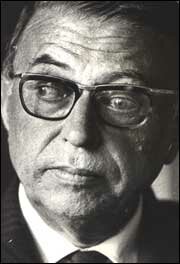


? ? ?


Jean-Paul Satre
|
The heroes of Jean-Paul Sartre's novels found freedom only in the privacy of self-determination and death |
|
In John Osborne's 1956 play Look Back in Anger, the definitive antihero, Jimmy Porter, announced angrily: "There aren't any good brave causes left." Marlon Brando's Wild One, when asked what he was rebelling against, replied: "Whaddya got?" The heroes of Jean-Paul Sartre's novels found freedom only in the privacy of self-determination and death, and Sylvia Plath's last poetic act was her own suicide. These were nihilistic identities created out of disbelief.
For, through the 1950s and 60s, though the wealth of the developed world rose exponentially, so did disbelief. Locked in a cold-war gamble in which human life was the bet, we told ourselves destructively consoling stories about the end of all stories. Sartre's philosophy insisted that the very act of turning our lives into a story was an act of "bad faith". There was nothing to be said or done beyond the lonely individual's act of self-creation. Yet we self-created in surroundings of unprecedented luxury. The family car provided personal transport that, a century before, would have been beyond the dreams of kings. Television beamed alternative lives into our homes. And, for most in the West and increasingly in the Far East, the necessities of survival were provided at the supermarket and the hospital. Mere survival could no longer give us a story. It had become consumption. All that was left to do was luxuriate in our own nihilism. Or we could, as Stanley Kubrick advised in his film Dr Strangelove, "learn to stop worrying and love the bomb". The human need for narrative, however, was irrepressible. People still had to explain themselves to themselves. New stories were created. They were tuned to the mood of the times and they are all still with us. There was, most obviously, the story of youth that grew up to become the story of self. The youth culture that was born in the 1950s and came to maturity in the 1960s was a consoling myth of dissidence, freedom, self-definition and, ultimately, the subjugation of all communal moral injunctions to the authority of the self. "If it feels good," they said, "do it." Going to the jungles of Vietnam did not feel good, and so, around resistance to that war, developed an entire youth ideology. Resistance provided solidarity, but it was a solidarity of atomistic selves. The young would get together to resist the wars of the old, but, otherwise, they would live for the satisfaction of their private pleasures and impulses. Drugs and rock music became instruments of escape from the meaningless life of bourgeois consumption. The Vietnam war symbolised the brutal poverty of that life. It provided a frame in which a generation painted a picture of itself. Of course, the war ended, the young grew up, became middle-aged and acquired jobs and families, but the moral force of their myth of atomised solidarity survived the transition. In companies and government, the 1960s generation came to power, bringing with them their myth. The prevailing moral orthodoxy of the developed world is now that of the 1960s young - to believe in nothing but the development and pampering of the self. Go to - Next Page | Previous Page | Home |